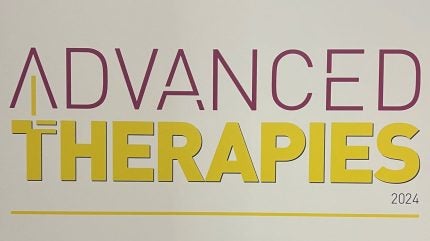Delivery and manufacturing hurdles remain in the cell and gene therapy
21 Mar 2024
Cell TherapyImmunotherapy

Preview
Source: Pharmaceutical Technology
The Advanced Therapies 2024 conference in London. Credit: Irena Maragkou/Globaldata.
The current prospects and obstacles in the cell and gene therapy space were the key focus of a panel at the Advanced Therapies conference, which took place on 19-20 March in London, UK.
During the panel session entitled ‘Autologous versus allogeneic?’ four experts discussed the development challenges of allogeneic cell therapies such as the risk of rejection, integration barriers and the need for further engineering to make allogeneic therapies hyper-immunogenic.
Stefanos Theoharis, CEO of OneChain Immunotherapeutics, which is developing chimeric antigen receptor (CAR)-T therapies, said: “In theory, allogeneic cell therapies have all the advantages, are cheaper and immediately available for the patient.”
He added that during the early days of autologous cell therapies, 30% of patients were not able to receive autologous cell products, either due to disease progression or death before the completion of the manufacturing process. In comparison, allogeneic therapies can be manufactured faster.
In this oncology space, “a one-size-fits-all approach is unlikely to be successful,” said Raphael Ognar, president, chief executive officer and co-founder of the cell therapy biotech NKILT Therapeutics. Current cell therapy methods have several limitations, including accessibility issues and the need for more cost-effective and efficient manufacturing processes. With autologous cell therapies, Ognar said: “Their big Achilles’ heel is that you can only manufacture them in a handful of centres in Europe, and maybe two handfuls of centres in the US.” He added that this will pose a challenge when tackling common cancers such as lung, breast and prostate cancer.
See Also:
Capstan secures $175m Series B funds for CAR-T therapy

Preview
Source: Pharmaceutical Technology
Delivery tech remains challenging with gene therapies for brain disorders

Preview
Source: Pharmaceutical Technology
Ognar concluded that the way forward is to find the most adaptive approach that will best suit a particular type of cancer. In some cases, allogeneic therapies could keep the patient cancer-free until clinicians find the next treatment step, while in other cases, autologous therapies will be best suited as the only treatment that will have the patient responding to therapy, he said.
Lindsay Davies, CSO at Swedish biotech NextCell Pharma, highlighted the need to understand the environmental factors that impact how these diseases are evolving and then assign therapies that will provide longevity and commercial applicability.
For more details,please visit the original website
The content of the article does not represent any opinions of Synapse and its affiliated companies. If there is any copyright infringement or error, please contact us, and we will deal with it within 24 hours.
Indications
Targets
-Drugs
-Hot reports
Get started for free today!
Accelerate Strategic R&D decision making with Synapse, PatSnap’s AI-powered Connected Innovation Intelligence Platform Built for Life Sciences Professionals.
Start your data trial now!
Synapse data is also accessible to external entities via APIs or data packages. Leverages most recent intelligence information, enabling fullest potential.




